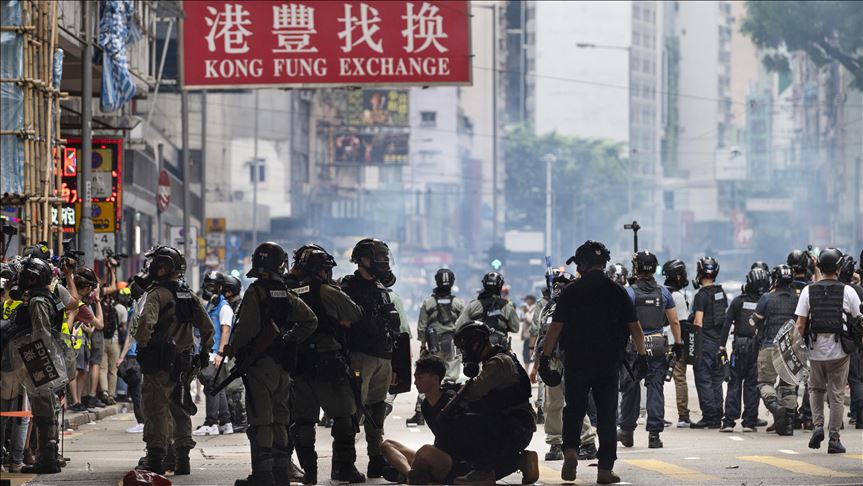UK seeks help in resettling refugees from Hong Kong
Australia is considering a British request to resettle tens of thousands of Hong Kong residents if the security situation deteriorates there, and could look at a special humanitarian intake from the Chinese territory if needed.
British Foreign Secretary Dominic Raab asked his Five Eyes counterparts including Foreign Minister Marise Payne on Tuesday to consider whether they could provide residency for some of the 314,000 British National Overseas passport-holders in Hong Kong. The request comes amid discussions within the Morrison government on potential support for Hong Kong citizens who may be forced to flee if Beijing makes good on its threat to introduce security laws in the territory.
There is concern within the ministry and on the backbench over the ramifications of the laws, which would allow Chinese security agencies to operate in the territory and ban “any acts or activities” that endanger China’s national security.
The government says a large number of Hong Kong citizens could be allowed into Australia under skilled and business visa categories, if the need arises, given the slowdown in arrivals since COVID-19 border closures.
A special humanitarian intake, like that extended to 12,000 Syrian refugees under the Abbott government in 2015, is seen as a fallback option. “We are looking at options to welcome people if the current avenues aren’t sufficient,” one source said.
BNO passport holders do not have right of abode in Britain, but Mr Raab told the British parliament that if China followed through with its planned crackdown, the UK would override the current six-month residency limit for BNO passport holders, giving them “a pathway to citizenship”.
He said he had raised the plight of BNO passport holders in a teleconference with Senator Payne and counterparts from the US, Canada and New Zealand: “I raised it on the Five Eyes call yesterday, the possibility of … burden-sharing if we see a mass exodus from Hong Kong.”
One source said the acceptance of refugees from Hong Kong would allow Australia to take advantage of their entrepreneurial abilities, as well as the capital they brought with them.
China says the new security laws, which will bypass Hong Kong’s legislature, are needed to tackle “terrorism” and “separatism” in a restless city it now regards as a national security threat.
China could keep dual citizenship Canadians from leaving Hong Kong amid protests: lawyer
A Canadian legal activist is warning the federal government to grant asylum to democracy activists in Hong Kong and expanded settlement to those with links to Canada before China prevents them from leaving.
The warning came Monday from Avvy Go, the director of the Chinese and Southeast Asian Legal Clinic, which has already helped bring Hong Kong pro-democracy activists to Canada.
There are 300,000 Canadians of Hong Kong descent in China, and Go says if Ottawa doesn’t act now to accommodate those who want to leave, Beijing will prevent them from leaving in the future.


“Even with those who are Canadian citizens, China may refuse to recognize their dual citizenship status and deny their exit from Hong Kong.”
MPs from the four major Canadian political parties and one independent senator stood in solidarity with the proposals Go put forward at a virtual press conference convened by Amnesty International.
Canada, along with the United States, Britain and Australia, have condemned Beijing’s imposition of a new national security law that they say violates Hong Kong’s freedom from Chinese communist interference.
“This is the Beijing government’s most breathtaking, threatening and callous attack yet … discarding any pretence of fulfilling China’s international promises made when Hong Kong was handed over in 1997,” said Alex Neve, the secretary general of Amnesty’s Canadian branch.
Go called on the federal government to implement several immigration and asylum measures, to help people get out of Hong Kong before it is too late. They are:
— Expediting family sponsorship applications by Canadians with spouses and parents in Hong Kong.
— Expanding family-reunification sponsorship programs beyond parents and spouses.


— Issuing more temporary-resident permits, work visas and student visas.
— Granting refugee status to democracy advocates, and offering them stepped-up resettlement options.
Last year, Hong Kong residents took to the streets in mass protests against a proposed extradition law from Beijing that was eventually abandoned.
During that unrest, Go’s clinic received requests from Canadians of Hong Kong descent whose relatives participated in pro-democracy protests, she said.
Since Beijing announced the new security law, the clinic is getting calls from Canadians who are worried about their families even though they may not have been involved with the democracy movement, said Go.
“These are our people. And as parliamentarians dedicated to promoting and protecting democracy, we cannot stand by silently. I endorse all of the actions,” said Independent Sen. Marilou McPhedran.
McPhedran said she has travelled across Africa and seen the effect of China’s massive development spending, an influence-buying effort that many analysts say is a power play by Beijing’s ruling communist party.
“The weaponization of economic support is something that we need to understand better as we look at what is happening in Hong Kong,” said McPhedran.


“The violation of the Hong Kong Basic Law, which is the essence of what China is saying it is going to do, is in fact a precursor to threats to democracies in many other countries as well.”
Conservative MP Kenny Chiu, who was born in Hong Kong, said the people of his homeland respect human rights and the rule of law, and they are prepared to commemorate Thursday’s anniversary of the Tiananmen Square massacre that saw the Chinese army kill scores of pro-democracy student protesters in 1989.


“We’re witnessing in Hong Kong basic dictatorship in disguise, exerting its power out of fear for these values,” said Chiu.
Opponents, including many Western nations, fear it will bring mainland-style political oppression to a business hub that was promised freedoms and autonomy for 50 years after its 1997 handover from Britain.


No comments:
Post a Comment
Comments always welcome!